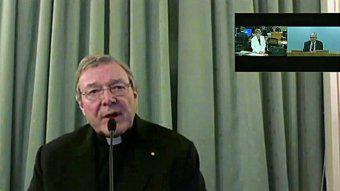|
George Pell and the power of indifference
By Cathy Humphreys
Victims of child sexual abuse have reason to feel disappointed by George Pell's testimony so far at the Royal Commission, writes Cathy Humphreys. "It was a sad story and not of much interest to me." There are moments in Cardinal George Pell's testimony when you realise that he is telling the truth. In the 1970s, Pell was an ambitious young priest who had returned to Australia, fresh from Oxford, wanting to be a man of power and influence in the church. The lives of vulnerable young people and their families held little interest for him. Inconvenient truths about paedophile brothers and priests were best avoided by a man on the make. This is not the sort of 'truth' that the victims of child sexual abuse in Ballarat at the hands of the priests and brothers who presided over churches, schools and residential children's homes would be hoping for. The truth about the things George Pell knew about the abusive brothers he lived and worked with would be high on their agenda. Thus far, they have been disappointed. Victims and their families who were devastated by rape and sexual abuse by priests and brothers would also look for a personal apology for his lack of intervention to stop and prevent the abuse. He was there. Either through ignorance, or a blind eye, or actively choosing to ignore the rumours circulating about his sexually abusing brothers, he failed to act. Many would also look to him to apologise on behalf of the institution of the Church for its failings towards vulnerable children. He is, after all, Australia's most prominent priest. There are different forms of apology. There is the superficial apology that says, "sorry but...". This is the worst form of apology as anything said before the "but" does not count. There is also the apology that says, "Sorry mistakes were made", but then does not outline the nature of those mistakes or recognise and detail the damage done by those mistakes. The detail is important to survivors of abuse and their families and community around them. The recognition of the different ways in which their trauma has manifested itself through their lives is central, not trivial. So far George Pell has made some clear statements about the wrongs done, but his testimony remains devoid of detail in understanding the extent of harm which has devastated the lives of so many. Here is another statement of "truth" that we have heard from George Pell:
This is a devastating statement. In Pell's view, a few rogue priests and brothers are the problem. The poverty of this analysis is extraordinary. However, it represents a convenient truth for Pell. It means that no change is required in the structures of support, training and supervision of brothers and priests. We have never heard in response to the Royal Commission that the Catholic hierarchy recognises that change is required not only in terms responses to victims, but in ensuring that the Church is not turning out priests and brothers who will prey on the vulnerable rather than pray with and for them. There is clearly a problem about training and equipping priests to live with celibacy. The problem is obviously not celibacy. If only it was! It is the lack of celibacy which is problematic and many of these men graduated from seminaries with distortions in their sexuality and an inability to manage the power that they wielded within their church communities. Managing these problems through attrition - very few young men are now entering the seminary - is not a substantial way of recognising the need for reform. It would be good to hear from Cardinal Pell about the ways in which the recruitment, training and education of priests and brothers has changed. Are they still graduating a significant group of men with a failure in their moral compass in relation to vulnerable children? Are they supervising and supporting the priests and brothers they have trained differently so that the abuse of power seen in Ballarat and elsewhere will not occur again? Thus far, there is nothing reassuring in Pell's testimony on any of these issues. This is galling for those who deserve an apology that offers hope for healing and meaningful change. It is also sad for the Roman Catholic Church that such a senior figure is found to be so wanting in his leadership and analysis of the structural weaknesses of the church. These failings in the past led to the Diocese of Ballarat in the 1970s and early 80s being, in the words of David Marr, one of the most dangerous places in Australia for children. Victims, families and communities need greater reassurance about how and why this will not be able to happen again.
|
.
Any original material on these pages is copyright © BishopAccountability.org 2004. Reproduce freely with attribution.
